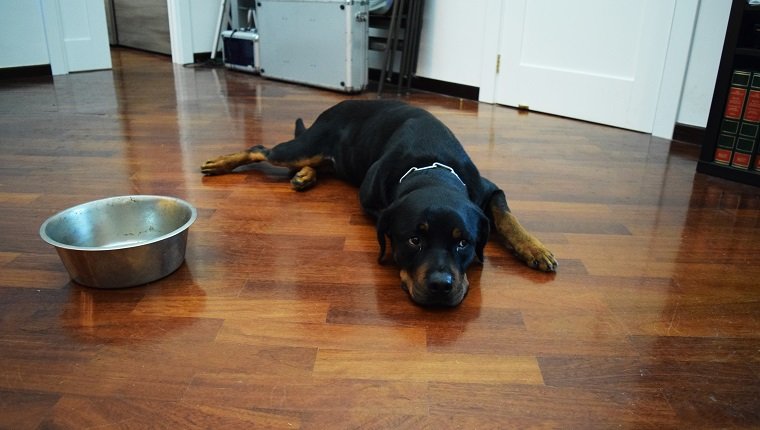Esophagitis in dogs is an inflammation or infectious disease of the esophagus, often caused by acid reflux, though there are other causes, too.
The esophagus links the throat to the stomach, which exposes it to regurgitated stomach contents. This is the most common cause of esophagitis.
When a dog suffers from esophagitis, both the inner and outer layers of the organ become inflamed. If this inflammation is mild, then dogs may not present symptoms. However, if it’s severe, dogs may have difficulty swallowing and eating, develop a fever or serious cough, feel pain in the neck or throat, lose weight, or develop pneumonia.
If you see the signs of esophagitis in your dog, then you must consult your veterinarian so they can form a proper diagnosis, find the underlying cause, and prescribe treatment. Here’s what you should know about the symptoms, causes, and treatments for esophagitis in dogs.
Symptoms Of Esophagitis In Dogs

The symptoms of esophagitis in dogs depend on how severe the inflammation in the esophagus is. If it’s mild, then dogs may present no symptoms at all, or they may only present slight symptoms for several weeks or months. When it becomes severe, symptoms can be extreme.
Esophagitis can be a secondary condition caused by another illness, so additional symptoms may also be present. These symptoms may also get worse if pneumonia develops.
Here are a few signs that often appear in dogs who suffer from esophagitis:
- Pain in the neck or throat
- Coughing
- Difficulty swallowing
- Increasing attempts to swallow
- Signs of pain while swallowing food (yelping, whimpering, etc.)
- Drooling
- Vomiting or regurgitating
- Loss of appetite
- Weight loss
- Abnormal posture or movements
- Refusing to lie down
- Fever
Causes Of Esophagitis In Dogs

Because of the esophagus’s close proximity to the stomach, gastrointestinal issues are often the cause of esophagitis in dogs.
Acidic stomach contents can easily cause inflammation in the esophagus. This is not, however, the only cause of the condition.
Here are several possible factors that can lead to esophagitis in dogs:
- Acid reflux
- Ingestion of chemical irritants
- Bacterial, viral, or parasitic infection
- Aspiration pneumonia
- Food allergies
- Having a feeding tube or anesthesia during surgery
- Chronic vomiting
- Obstruction or foreign object lodged in the esophagus
- Eating non-food items
- Failing to fully swallow medication
- Inflammatory bowel disease
- Congenital (present from birth) abnormalities of the esophagus
- Megaesophagus
- Tumors
- Stomach ulcers
Treatments For Esophagitis In Dogs

The treatments for esophagitis in dogs can vary depending on the underlying cause, but usually vets recommend dietary changes to promote healing of the esophagus.
Vets often prescribe low fat, low protein, high carbohydrate foods that are low in allergens such as soy or gluten. These are usually given in small amounts, and food and water should be somewhat restricted so the esophagus can recover.
If the cause of the esophagitis in dogs is acid reflux or gastrointestinal problems, then vets may prescribe antacids or coating agents that soothe the esophageal mucous lining. They may also prescribe drugs to help with swallowing or help move food more easily through the digestive tract. Antibiotics can help fight bacteria that can cause ulcers.
For mild cases, vets usually give dogs outpatient care, but for severe cases like those where pneumonia develops, vets may recommend hospitalization. They will give intravenous fluid for dehydration, and they can use oxygen therapy for dogs that have trouble breathing. Vets may also prescribe antibiotics in these cases.
Sometimes there can be strictures, or narrowing, of the esophagus. A vet can install a balloon catheter and inflate it to widen the stricture. They may need to use surgery to remove objects or blockages, and they can treat tumors with chemotherapy or radiation.
Do you keep an eye out for signs of a sore throat in your dog? Has your vet ever treated your pup for esophagitis? Then let us know in the comments below!









